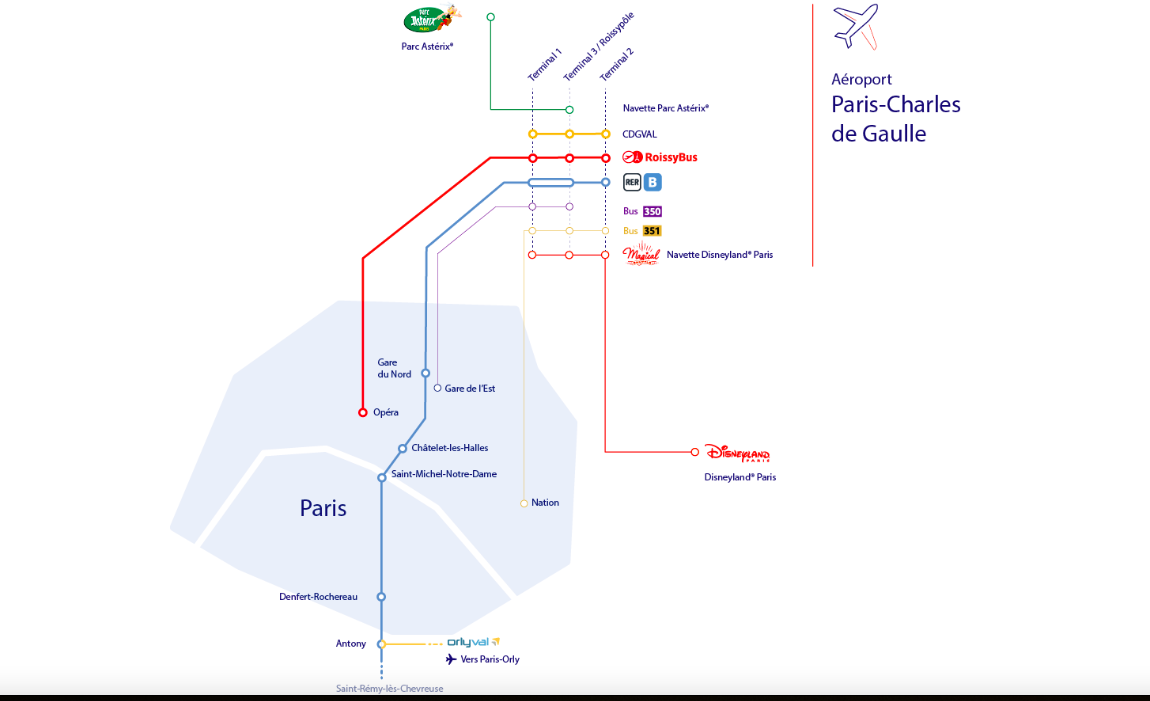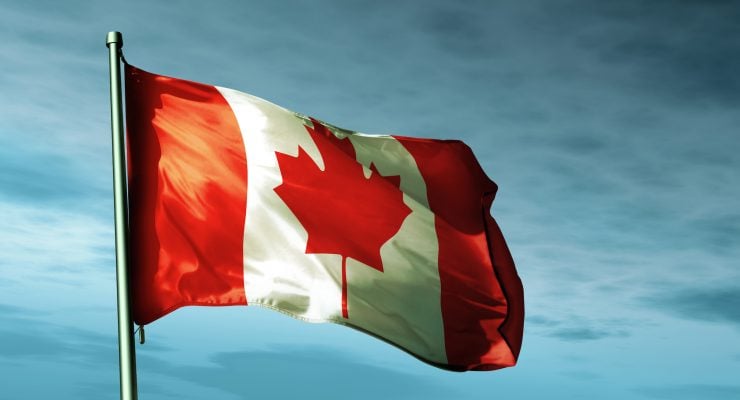You’re almost ready for your Working Holiday adventure in France, but a few details are still a bit fuzzy. How will you get from the airport to your place? Where should you go shopping for essentials right after you arrive?
Let’s clear things up to help you start on the right foot!
How to get from CDG to anywhere in France
Chances are you will land at Paris-Charles de Gaulle (CDG) airport, also occasionally called “Roissy” after the name of the city.
Like most airports, it’s not exactly located minutes away from the Eiffel Tower but there are several options to get where you need to go.
Long-distance TGV trains
If you’re heading straight to a French city other than Paris, you may be able to take the high-speed TGV train directly from CDG instead of going to one of the downtown Paris train stations.
The CDG SNCF train station is located just beneath Terminal 2 and you can buy tickets online before your trip on the SNCF website.
RER B train to downtown Paris
The RER B will take you all the way to Gare du Nord or Châtelet-Les-Halles downtown Paris. Both of these stations are convenient hubs to take another subway line if needed.
A one-way RER B ticket from CDG is € 11.40, and you can buy your ticket at one of the machines located under Terminal 2. You can pay in cash or by credit card.

Taxis from CDG
You can always take a taxi or an Uber just outside the terminals but don’t risk getting a ride from an illegal taxi scooper.
Legit taxis have taxi lights and signage and drivers will never get out of their vehicles.
If you want to use a ride-share service, book your ride through the app.
Scam taxis will rip you off and this is probably not the best introduction to France!
Buses from CDG
Several buses take you to downtown Paris. This is a cheaper option, but it’s a long ride and there won’t be much room for luggage.
All buses stop at terminals 1, 2AC, 2D, 2EF or 3. The Roissybus is €16.20 for a 60-minute trip. Between 6 a.m. and 8:45 p.m., the bus runs every 15 minutes, and between 8:45 p.m. and 12:30 a.m., every 20 minutes.
For buses 350 or 351, a one-way ticket is €6 (if purchased on board). You can also buy your ticket at the airport or Métro-RER stations. Bus 350 takes about 65 minutes to reach Paris-Porte de la Chapelle, and runs every 15 to 35 minutes. Bus 351 reaches Paris-Nation in around 75 minutes, running every 9 to 40 minutes.
See the airport website for more details.

How to get a French SIM card and phone plan
First things first, remember to cancel your phone plan or put it on hold before you leave!
You should be able to access free WiFi at the airport when you arrive in France but you will also probably need a local SIM card as soon as possible. The rates are fairly competitive in France (especially compared to Canada or Australia!) and you have the choice between several low-cost providers.
Free
Free (yes, that’s the name of the provider!) offers a very attractive plan for €19.99/month with 210 GB of data, including 25 GB to use in 70 destinations (Europe, Canada, USA, Australia, etc.), and unlimited calls and SMS. This is a great option if you plan to go home during your Working Holiday adventure.
Alternatively, the €12.99/month plan comes with 110 GB of data, including 18 GB in 4G for Europe only, and unlimited calls and SMS.
Free makes it super simple to get a SIM card—you don’t even need a French bank account or home address.
Red SFR
Red SFR offers an easy way to compare the different plans.
For €14.99/month, you get 40 GB of 4G data, including 30 GB to use in the European Union and 20 GB in the USA and Canada. Calls and SMS are unlimited. An additional 60 GB is an extra €4/month.
Alternatively, there’s a €5/month plan with 30 GB of data to use in the European Union, the USA and Canada, with unlimited calls and SMS.
Sosh
Sosh offers two great value plans. The first is €20.99/month for 140 GB of data to use in France and 25 GB to use in Europe. The second is €15.99/month for 130 GB of data in France and 20 GB in Europe. Both plans include Europe-wide unlimited calls and SMS.
Orange
Orange is a bit more expensive than Free or Sosh. All plans include unlimited calls and texts within Europe. The 24-month contract at €21.99/month includes 40 GB of data. There’s also a 200 GB 5G plan for €24.99/month for the first 12 months, then €36.99/month for the final 12 months. This plan also includes 120 GB of data for Europe.
Good to know: some companies, such as Orange, may require proof of residence in France. You can also get a discount if you bundle services, for instance, fibre Internet and a phone plan.
How to choose a French financial institution
You will have to open a bank account in France if you’re going to work. Several options are available but you may want to consider opening an international bank account with a neobank.
Neo-bank options
A neo-bank is a bank that operates exclusively online. It allows you to transfer money between different currencies, which will come in handy for Working Holiday permit holders and international travellers. Signing up is also typically easier than with regular financial institutions, which may require proof of income. The drawback? You can’t deposit cash or cheques.
Online banks operate like neo-banks but they are an extension of traditional banks—for instance, Hello Bank belongs to BNP Paribas.
Wise is a fully online bank (neo-bank) that lets you send, receive and spend money abroad. To open a Wise account, all you need is a copy of an ID document, proof of address and, most importantly, a telephone number. Opening an account is 100% free, and you can order a physical card for €7. You can exchange money in 50 currencies. The account can be linked with a Canadian bank account, including Desjardins, for easy money transfers between the two institutions. PVTistes.net offers a great deal with Wise, check it out to get your first money transfer free.
Alternatively, you can also compare different online banks, such as Revolut or N26.
This is a great choice because you will be able to make purchases with your credit (Visa, Mastercard) or debit card in France.
How to shop for essentials in France
Grocery shopping
France is a world-famous destination for foodies but keep in mind—most supermarkets (and shops in general) are closed on Sunday. In big cities, some supermarkets and bakeries are starting to open until 1 p.m. or occasionally until the evening. Find these options because, like most French, you will occasionally realize that the fridge is empty on Saturday night!
However, a good thing about France is that there are often markets on weekends. You’ll find quality, seasonal produce, sometimes cheaper than at the supermarket.
Lidl, Intermarché, Leclerc and Super U often offer the most competitive prices. Other supermarket chains include:
- Carrefour (Carrefour Express stores are more expensive than Carrefour City)
- Match
- Casino
- Franprix
- Auchan
- Monoprix
You will also find plenty of independent bakeries, butcher shops, cheese shops and more—the French do love shopping for food, cooking and eating!
Buying alcohol
You can buy beer, wine and spirits in supermarkets and convenience stores. Generally speaking, buying and consuming alcohol in France is more straightforward than in Canada or Australia, for instance.
While there are no designed liquor stores, wine stores offer an extensive selection and expert advice—the chain Nicolas is one of the top retailers.
Pharmacies, personal hygiene and beauty products
In France, you will find “pharmacies” and “parapharmacies.” For over-the-counter medicine, prescription drugs and expert advice, you should go to a “pharmacie.” But if you’re looking for skincare, essential oils, fancy soaps and more, you shop at the “parapharmacie.”
Personal hygiene and beauty products are also available in supermarkets. However, you can only find over-the-counter drugs in pharmacies.
Good news, taxes are included and tipping is optional!
If you’re Canadian, you’re probably used to prices without taxes included. But in France, if the sticker says €5, you will actually pay €5—the prices shown are “TTC” (“toutes taxes comprises”). For your information, VAT in France is either 5.5% or 20%, depending on the product.
Unlike in Canada, tipping isn’t socially mandatory in France. Food service workers always appreciate a small tip (nowhere like 20%, this is not North America!) but it would be a faux pas to tip other professions like hair stylists, mechanics, etc.

















 Français
Français English
English




0 comments
{{like.username}}
Loading...
Load more